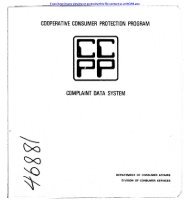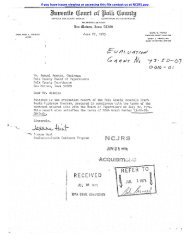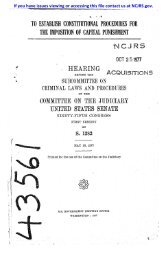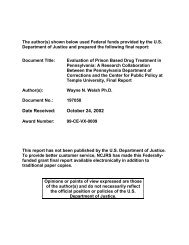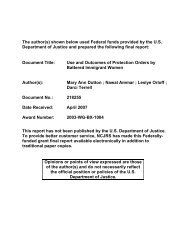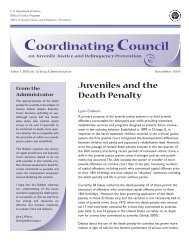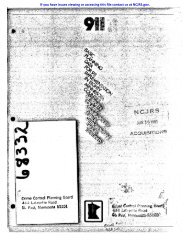Conflict Resolution Education - National Criminal Justice Reference ...
Conflict Resolution Education - National Criminal Justice Reference ...
Conflict Resolution Education - National Criminal Justice Reference ...
Create successful ePaper yourself
Turn your PDF publications into a flip-book with our unique Google optimized e-Paper software.
Low self-esteem, which is common among youth in<br />
juvenile facilities, is often the source of these conflicts.<br />
For many of these youth, bullying or “putting<br />
down” someone is the only means of achieving status<br />
among peers. As a counselor in a juvenile facility<br />
remarked, “These kids don’t know how to walk<br />
away from a fight without losing face.”<br />
Virtually all of our young men are gang<br />
affiliated and come from families where<br />
conflict was resolved through abuse or<br />
violence. . . . <strong>Conflict</strong> management goes<br />
beyond stabilizing the institution; it gives<br />
the youth a chance to take on a positive<br />
role, learn verbal skills, and overcome<br />
violent tendencies. It not only benefits<br />
the kids, but also the community to which<br />
they will return.<br />
Juvenile facility director, Camp Miller,<br />
Los Angeles County<br />
Types of <strong>Conflict</strong>s Not Handled<br />
<strong>Conflict</strong> managers are not asked to intervene in a<br />
violent confrontation, especially when weapons are<br />
involved. After the heat of the battle has passed, the<br />
disputants may meet with conflict managers to find<br />
ways to avoid further violence.<br />
Other matters typically excluded from conflict manager<br />
attention are disputes between staff and wards.<br />
Handling such conflicts may raise staff objections<br />
and other programmatic challenges, especially in<br />
the case of new programs. However, because some<br />
high school mediation programs have successfully<br />
handled teacher-student conflicts, it may be possible<br />
for juvenile facility programs to expand into this area.<br />
<strong>Conflict</strong> Manager Selection<br />
<strong>Conflict</strong> managers are selected jointly by staff and<br />
wards to ensure they will have the respect and support<br />
of both groups. Generally, the members of each<br />
group are asked to make nominations. Staff then<br />
review the list of wards who have received the greatest<br />
number of nominations and select 12 to 15 out of<br />
49<br />
this group to enter training. The wards who become<br />
conflict managers are seen as leaders by their<br />
peers, but frequently “negative” leaders are nominated<br />
by their peers and approved by staff. This<br />
is done because experience as a conflict manager<br />
often draws out the talent of negative leaders,<br />
allowing them to make a positive contribution to<br />
the facility.<br />
<strong>Conflict</strong> Manager Training<br />
Because of ward turnover, training for new conflict<br />
managers is conducted every few months. Often current<br />
conflict managers are asked to assist in training<br />
those who are new. Ongoing meetings among conflict<br />
managers are held to provide further training, assessment<br />
of the program, and group discussions.<br />
During their training, conflict managers learn basic<br />
communication skills, such as helping disputants feel<br />
comfortable in talking, listening in a way that will<br />
defuse anger, and speaking to disputants in a direct<br />
but diplomatic way. They also learn about the threestage<br />
conflict management process—the goals of<br />
each stage, the questions to ask at each stage, and<br />
methods of handling common problems.<br />
<strong>Conflict</strong> Manager Supervision<br />
Because training in this model should be considered<br />
an ongoing process, staff coordinators for the <strong>Conflict</strong><br />
Manager program meet with the managers for<br />
at least 1 hour every week so that they can share<br />
their experiences and talk about problems they have<br />
encountered in their work. If time allows, conflict<br />
managers are asked to role-play a difficult case and<br />
discuss it together.<br />
Potential Benefits of <strong>Conflict</strong> Manager<br />
Programs<br />
<strong>Conflict</strong> Manager programs reduce tensions and<br />
save staff time by taking care of conflicts that would<br />
otherwise absorb hours of their day. At the same<br />
time, wards who participate in conflict management<br />
sessions are positively affected because they have<br />
the opportunity to experience new ways of dealing<br />
with conflict. Also, by resolving conflict constructively<br />
before it escalates or requires a counselor,



